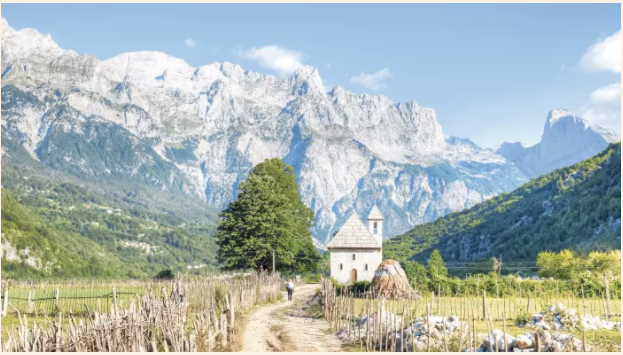
Pastoral life has remained unchanged despite decades of political unrest and a growing number of visitors.
With aching legs and bursting lungs, we staggered up the rocky tip of Mount Gjeravica, Kosovo’s highest mountain. It was worth the effort. From our 8,714-foot vantage point we surveyed some of the wildest, most majestic and least spoiled scenery left in Europe.
Beneath the bluest sky, and in the purest air, we admired the jagged peaks and ridges, the deep green bowls and pristine valleys that stretched away in every direction. No builder of model railway sets could possibly have created such an epic landscape.
This remote and mysterious mountain range, much of it accessible only by foot, offers more than beauty. It hosts shepherds and goatherds and ancient pastoral traditions that have yet to be destroyed by mechanisation. In its isolated villages, traces still survive of a centuries-old code of conduct that combines extremes of punishment and generosity.
For much of the 20th century, conflict and dictatorship kept outsiders away from the Accursed Mountains. Even today, few foreigners venture far into their hidden fastnesses. But that is changing. For the first time since the onset of the second world war, they are beginning to open up.
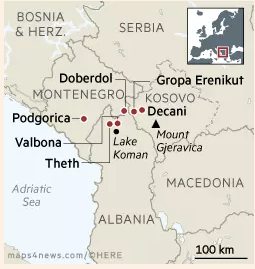
It was that name — the Accursed Mountains — that first caught my attention. A Google search showed that they spanned the borders of Kosovo, Albania and Montenegro. Further investigation revealed that in 2012 a German government agency opened a 120-mile circular trail, the Peaks of the Balkans, to attract walkers and promote unity among the region’s historically fractious Muslim, Christian and Orthodox communities.
.We were met at the airport by Virtyt Gacaferi, a fixer for western journalists during the Kosovo war of 1998-99 who now organises hikes in the Accursed Mountains and had laid on all our transport, guides and accommodation for scarcely €100 per person per day.
The expedition started inauspiciously. Outside the airport we were hit by the furnace heat of high summer. Our minibus was delayed an hour at the Albanian border, where the officials angled for bribes. We penetrated the mountains via a two-hour boat ride up the long, deep gorge of Lake Koman, but its rugged beauty was marred by the thousands of discarded water bottles floating on its surface.
We reached our guest house in the village of Valbona long after dark, so it was only the next morning that we realised we had arrived in some sort of paradise. The old stone building was ringed by mountains, some still flecked with snow. We breakfasted outside off home-made breads, cheeses, jams and curds, with tomatoes, onions and cucumbers straight from our host’s vegetable patch and strong black Turkish coffee. Up here, the temperature was sublime.
Soon afterwards we set off on the first leg of our trek, our bags following on horseback. We climbed up through meadows and forest to a pass where Albania’s border with Montenegro was marked by nothing more than a crumbling concrete post. This was forbidden territory during the four decades after the second world war, when the Communist dictator Enver Hoxha turned Albania into Europe’s equivalent of North Korea. Those seeking to escape his hermit kingdom were shot on sight. If they succeeded, their families paid the price. Now we just strolled across.
We passed just one tiny settlement all day — a cluster of rudimentary stone shelters with roofs fashioned from rough wooden tiles whose inhabitants bring their cows, sheep and goats high up into the mountains to graze each summer. Their sole concession to modernity is solar panels.
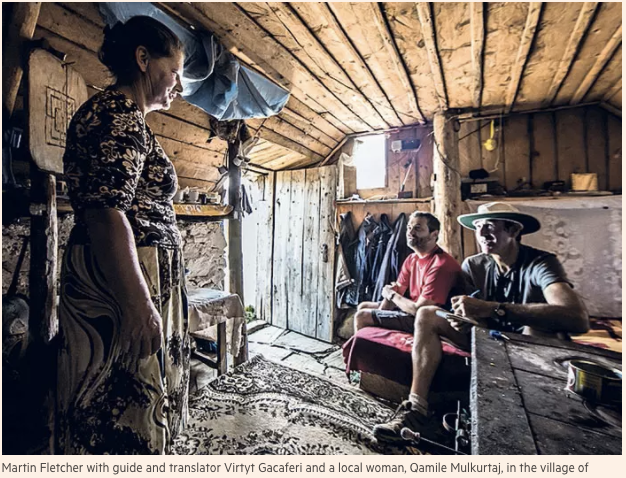
There we were offered oregano tea, and warm sheep’s milk with a creamy crust, by an elderly woman named Qamile Mulkurtaj, and we began talking about the Kanun — the complex code that governed the lives of Albania’s Malesori (mountain people) for at least four centuries until Hoxha banned it.
“The Kanun is more important,” she replied, to our surprise, when we asked whether it took precedence over laws passed by the government in distant Tirana. The blood feuds and revenge killings that the Kanun sanctions in the name of honour still occasionally occurred, she continued, and she told us of a chain of killings that began 10 years ago when a man who beat a boy was killed by the boy’s family. And yes, she replied when asked: she gave her daughter a bullet when she married to show that she was placing her life in her husband’s hands. “That’s how it should be,” she insisted.
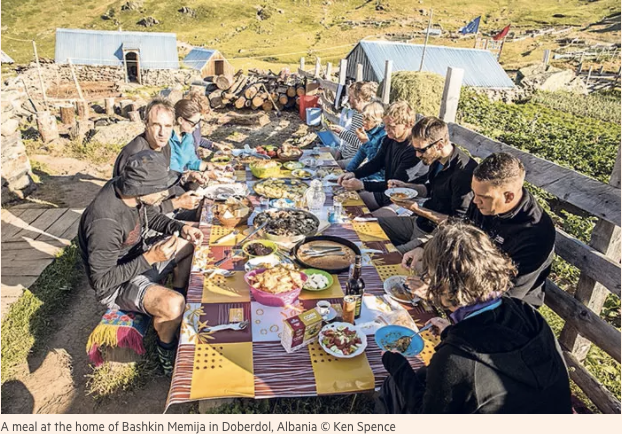
Late in the afternoon we reached Doberdol, a picturesque collection of rustic huts randomly scattered across the floor of a great green basin that was our destination for the night.
Bashkin Memija, a former Albanian army chef, welcomed us into his stockaded home. As he and his wife cut up a lamb they had killed for us, we drank cold beers and watched villagers bring in their livestock from the surrounding hills. That night we feasted on bean soup, spinach and onion pie, cornbread, goat’s cheese, roasted peppers and two great platters of fatty lamb — the head and sweetbreads included.
Fortified with fiery home-made plum raki (an alcoholic drink), we then retired to the two wooden sheds that served as dormitories, scarcely believing we were in Europe. I was awoken just once — by three gunshots followed by a cacophony of barking dogs. Wolves, Memija explained the next morning.
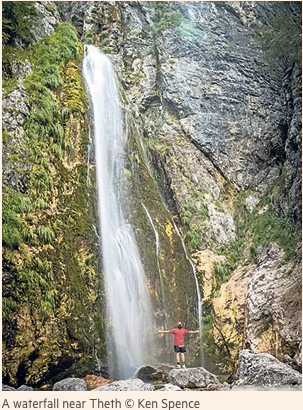
And so our expedition continued. We walked for a full week, covering a dozen miles a day in glorious sunshine, and while most of the hikes involved steep climbs and vertiginous descents, each was in its own way a delight.
We scaled mountain peaks where edelweiss grew, and negotiated long narrow saddles between sublime valleys. We walked through dappled forests of beech, oak and pine — the lairs of bears, lynx and wild boar. We ate picnic lunches in lush Alpine meadows carpeted with wild flowers and full of butterflies. We admired waterfalls, enjoyed bracing swims in turquoise lakes, filled our water bottles from ice-cold springs and traversed crystal-clear mountain streams on rickety log bridges.
We crossed no tarred roads, saw no vehicles and heard no planes — just tinkling cowbells. We criss-crossed the borders of Albania, Kosovo and Montenegro, though we would never have known we were doing so had our two fine guides not told us. We followed paths that had been used for centuries by traders, shepherds and — more recently — arms smugglers and refugees during the Kosovo war.
We passed few other hikers, but encountered several walnut-faced, crook-wielding herdsmen and women tending their flocks in the high pastures. Occasionally we heard them singing to their animals. Some offered us tea. One elderly man, Zog Lekaj, took us into a makeshift shelter to show how he turned his goat and sheep milk into fat white cheeses. “I’ve done this all my life,” he said. Lower down, in the valleys, we watched villagers scything their meadows and piling the grass on to dome-shaped haystacks with wooden pitchforks.
Most nights we spent with families who had turned their simple but spotless homes into guest houses. They had no internet or mobile signal, but fed us lavishly with the fresh and abundant products of their cowsheds, orchards, beehives and vegetable gardens. They cooked on wood stoves. They built bonfires to keep us warm when the temperature fell at night. They could scarcely have been more welcoming, and charged a pittance.
That is another legacy of the Kanun. Travellers must be treated as honoured guests. “The person who eats my food or drinks my water is like my brother,” said Musa Krasniqi, the owner of the extravagantly named Grand Hotel Gjeravica in the village of Gropa Erenikut, as he handed me a bottle of raki as a parting gift.
Krasniqi, 67, was a colonel in the Kosovo Liberation Army during the war, and badly wounded in his hip. The Serbian military destroyed Gropa Erenikut, just as it destroyed almost every other ethnic Albanian community in this part of Kosovo. Though the conflict ended two decades ago and those communities have long since been rebuilt, the scars remain.
We met numerous Kosovan Muslims who were forced from their homes by the Serbs’ ethnic cleansing and became refugees. We passed cemeteries filled with the graves of victims, including one in the village of Lubenik, where as many as 80 males — the youngest aged 14 — were massacred. Astrit Kastrati, one of our guides, helped the postwar mine-clearing operation.
We visited the 14th-century Serbian Orthodox Christian monastery of Decani, a Unesco World Heritage Site in the foothills whose Romanesque jewel of a church is adorned from floor to ceiling with ancient frescoes. The monks sheltered Muslim refugees during the war, so we were surprised to find it still guarded by armed Nato troops. A spokesman, Father Peter, explained that it had been attacked several times by Albanian extremists since the war ended, and that graffiti daubed on an outside wall in 2014 declared: “The Caliphate is coming.”
That said, most of the families we stayed with were Muslims — and models of moderation. They served us beer and raki. Few women covered their heads. There was no segregation of the sexes.
I never discovered why the Accursed Mountains acquired that name, but our last full day of hiking offered a clue.
The weather changed. Black clouds rolled in as we trekked up the mighty Ropojana valley from Montenegro towards Albania. The valley narrowed as we climbed, funnelling the cold wind. Great ramparts of sheer rock soared skywards on either side, and mist swirled around the bare, serrated mountain tops.
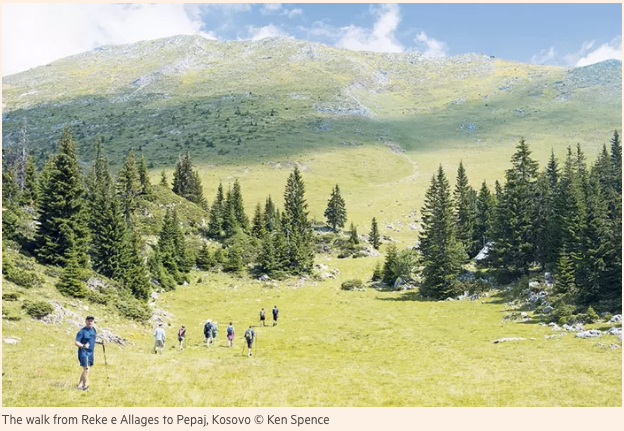
The landscape grew increasingly bleak and barren, littered with fallen boulders the size of cars. We encountered just one group of three shepherds, though there was precious little grazing for their flocks. Higher and higher we went until we eventually reached the 5,600ft pass and the Albanian border. There, camouflaged amid the moonscape, we found seven pillboxes — some partly destroyed, others with their concrete domes still intact, all with commanding views of the valley up which we had just laboured. Behind, sheltered by a low ridge, was an abandoned military barracks.
As a measure of Hoxha’s paranoia and delusion the pillboxes were hard to beat: installations designed to prevent an invasion of one Communist country by another (Montenegro was at that time part of the former Yugoslavia), and of a state in which the outside world had minimal interest. As a tourist attraction they were also hard to beat — genuine bits of cold war history, not restored and preserved like the Berlin Wall, but left to crumble in the harsh elements of this lonely mountain pass.
Beyond, we descended 3,000ft on a precipitous, switchback path into the forested valley of Theth, and arrived exhausted at another charming guest house run by two brothers — Pavlin and Nardi Polia. Close by was a 400-year-old stone tower with glassless slits for windows — a place where the targets of revenge killings under the Kanun could take refuge, for years if necessary. It was one of the few such kullas that Hoxha did not destroy.
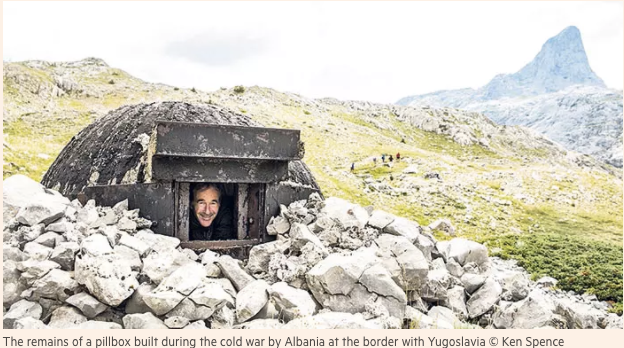
Theth is connected to the outside world by a single deeply rutted track that zigzags up and over the mountains to the south. Like Valbona, it is another departure point for hikes into the Accursed Mountains. Pavlin said the first hikers had appeared in the valley eight or nine years ago, to the bemusement of the villagers, and that more were coming every year.
When I voiced concern that too many would destroy the solitude and traditions that made the Accursed Mountains so special, Pavlin vigorously disagreed. Guest houses like his were buying the shepherds’ and farmers’ produce, he said. Tourism alone was making it possible for the Malesori to stay and maintain their old way of life instead of moving to the cities. “It’s keeping the mountains alive,” he insisted.
 Follow @jessethan for more articles like this!
Follow @jessethan for more articles like this!
Hi! I am a robot. I just upvoted you! I found similar content that readers might be interested in:
https://www.ft.com/content/eb5f4342-810b-11e7-94e2-c5b903247afd